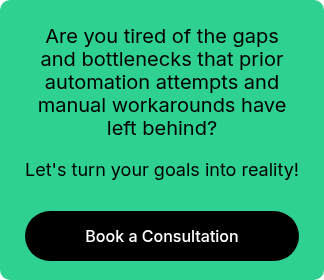Process Orchestration
Infocap’s process orchestration platform coordinates your existing applications, data sources, and automation tools into a unified, intelligent workflow engine.
Our experts work with you to map out end-to-end processes, define business rules, and automate decision points—ensuring that every step is optimized and accountable. With real-time dashboards, exception handling, and seamless integration, Infocap delivers the coordination and transparency needed for digital transformation at scale. Whether orchestrating customer journeys, supply chains, or compliance workflows, we help you achieve operational excellence across your entire organization.
Process Orchestration Capabilities
Process Orchestration is the backbone of enterprise automation—coordinating people, robots, data, and systems to ensure every workflow runs smoothly, efficiently, and transparently. Infocap’s process orchestration services empower organizations to manage complex, multi-step processes across departments and platforms, breaking down silos and eliminating manual handoffs. Our consulting services ensure that every task is assigned, tracked, and completed on time, with full visibility and control. By automating the flow of work and integrating disparate systems, Infocap enables your teams to focus on outcomes, not administration. Our human-centric approach ensures that process orchestration adapts to your unique business needs, driving agility, compliance, and continuous improvement.
What Intelligent Automation Means for Process Orchestration
Intelligent automation in process orchestration means moving beyond isolated bots or scripts to create truly end-to-end, adaptive workflows. By automating the coordination of tasks, data exchanges, and human approvals, organizations can eliminate bottlenecks, reduce errors, and ensure compliance—no matter how complex the process. Infocap enables dynamic, rules-driven orchestration that adapts to changing business needs, integrates with legacy and modern systems, and provides real-time visibility into every stage. This empowers your teams to focus on value creation, innovation, and customer satisfaction, while automation handles the heavy lifting and ensures nothing falls through the cracks.
End-to-End Workflow Automation
Process orchestration enables organizations to automate entire business processes, from initial request to final delivery. Every step—whether performed by a human, a bot, or an external system—is coordinated and tracked, ensuring seamless handoffs, timely completion, and full auditability. This reduces manual intervention, eliminates errors, and accelerates cycle times across the enterprise.
Cross-System Integration
Orchestration connects disparate applications, databases, and cloud services, enabling data and tasks to flow automatically between systems. This eliminates the need for manual data re-entry or reconciliation, ensures data consistency, and allows organizations to leverage existing technology investments while modernizing their workflows.
Dynamic Exception Handling
When issues or exceptions arise, process orchestration automatically routes them to the right people or systems for resolution. Automated notifications, escalations, and decision points ensure that problems are addressed quickly and transparently, minimizing delays and reducing the risk of missed deadlines or compliance breaches.
Business Rule Enforcement
Orchestration platforms embed business rules and policies directly into workflows, ensuring that every task is performed in accordance with company standards and regulatory requirements. Automated checks, validations, and approvals reduce the risk of non-compliance and free up staff to focus on higher-value activities.
Areas to Automate
Order-to-Cash Process
Automate the entire order-to-cash cycle—from order entry and credit checks to invoicing and payment collection. Orchestration ensures each step is completed in sequence, with real-time status updates and exception handling, reducing delays, errors, and manual handoffs.
Employee Onboarding
Coordinate multiple onboarding tasks—such as IT provisioning, payroll setup, training assignments, and compliance checks—across departments. Automated workflows ensure that new hires have everything they need from day one, improving employee experience and reducing administrative overhead.
Customer Support Escalations
Orchestrate the escalation of complex support cases by automatically routing tickets to the right experts, triggering knowledge base updates, and tracking resolution times. This ensures that customers receive timely, effective service and that critical issues are never overlooked.
Regulatory Compliance Workflows
Automate compliance-related processes, such as policy attestations, audit preparation, and incident reporting. Orchestration ensures that every step is documented, deadlines are met, and regulatory requirements are consistently enforced, reducing risk and audit fatigue.
Procure-to-Pay Automation
Streamline procurement by automating purchase requisitions, approvals, order processing, and vendor payments. Orchestration connects procurement, finance, and inventory systems, ensuring end-to-end visibility and control over spending.
IT Change Management
Automate the coordination of IT change requests, approvals, testing, and deployment across teams and systems. Orchestration ensures that changes are tracked, risks are mitigated, and compliance is maintained throughout the lifecycle.
